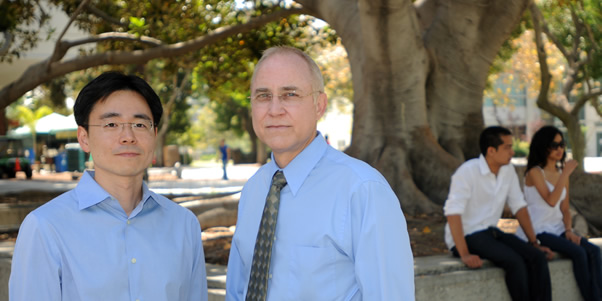Spiritual Impact
Professors Study Link Between Religion and Social Justice
July 28, 2009
By Mimi Ko Cruz
Preliminary results of a national survey of college students has found that, for them, spirituality has a positive effect on social justice.
David Chenot and Hansung Kim, Cal State Fullerton assistant professors of social work, are examining data, which was collected by the Higher Education Research Institute at UCLA. More than 14,500 students studying myriad disciplines at 136 colleges and universities throughout the country were surveyed in the fall of 2004 and again in the spring of 2007, at the end of the students’ junior year.
Through a $10,000 grant from the institute, Chenot and Kim now are analyzing the data to investigate possible connections between students’ levels of spirituality and their attitudes toward the populations who are most often supported by social workers. They also are investigating whether these connections vary based on the differing religious affiliations of students who participated in the survey.
The survey’s initial findings reveal, among other things, that while attendance at religious services declines, college students show significant growth in a wide spectrum of spiritual and ethical considerations during their first three years of college.
The type of analysis Chenot and Kim are conducting inquires about direct causal effects rather than associations or correlations. In other words, they are delving into the impact levels of spirituality have on personal perceptions about attitudes and actions concerning social justice.
The relationships between spirituality, religion and social justice in the lives of young adults are particularly important when considering the influence university students have in society as students and as professionals, Chenot noted.
“Most people would agree that a sense of social justice and behaviors that reflect social justice are very important to society,” he said. “This is particularly important for those who have less than others, are underrepresented in society, those who are discriminated against, etc. If a strong sense of spirituality has a positive effect on social justice, which is what we found, then it may be wise to pay more attention to spirituality by encouraging spiritual development.”
Since the years students spend in college are “extremely formative for most people, it is highly likely that the effect of spirituality on social justice carries into the rest of adulthood,” Chenot added. “Since social justice is so important for society, and most would agree that we would like college graduates to behave in a socially just manner no matter what their careers entail post-graduation, it follows that spirituality needs more attention as an important direct antecedent of social justice.”
So, the question for university faculty members, Chenot said, is “whether they recognize or deal with spirituality as they contribute to the development of their students — the people who represent the future of our society.”
That recognition is “extremely important in social work” because the discipline is dedicated to social justice attitudes and behaviors, he said.
Yet, Chenot said, spirituality is as controversial in social work as it is in other disciplines.
Chenot and Kim expect to finish their research by December and present their findings at conferences and in journals.


